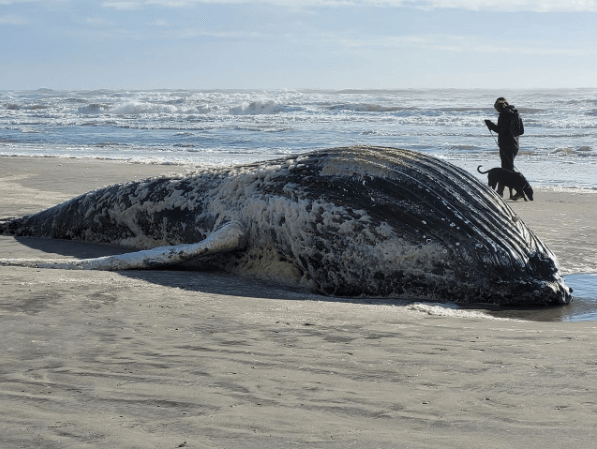A dead humpback whale was found floating along the Ambrose Channel off the New York-New Jersey coastline after the Atlantic Marine Conservation Society responded to a report from the United States Coast Guard on Monday, Feb. 27.
The carcass was recovered just days after a dolphin washed up in Atlantic Highlands on Wednesday, Feb. 22 and was later euthanized due to its condition. An additional three dolphins were found dead off the shore of Sandy Hook Bay just four days prior. The New York-New Jersey coastline has seen an influx of marine mammal deaths in recent weeks. Ten whales and four dolphins have washed up in the region since early December. The first, a 12-foot infant sperm whale, was found in Keansburg on Monday, Dec. 5. A humpback whale washed up in Amagansett the very next day and was followed closely by three other incidents in that month alone. January saw an additional three whale wash ups in New Jersey and New York, followed by two more incidents thus far in February with the most recent involving a 25-foot minke whale in Rockaway on Friday, Feb. 17.
The whale discovered on Monday was a humpback found adrift that had not yet washed ashore, and it’s unclear how many whales have been reported floating out on the ocean during this time span.
“As an avid surfer, I care about all sea creatures and hate seeing so many dead whales and dolphins wash up and knowing that it is because of us,” said Keegan Cannon, a senior communication student. “It’s so sad and infuriating.”
Concerned residents have questioned the role of offshore wind survey work to the sudden increase in whale and dolphin strandings, although the National Oceanic and Atmospheric Administration (NOAA) has said that no evidence has linked the two: “At this point, there is no evidence to support speculation that noise resulting from wind development-related site characterization surveys could potentially cause mortality of whales, and no specific links between recent large whale mortalities and currently ongoing surveys. We will continue to gather data to help us determine the cause of death for these mortality events.”
Moreover, whales are protected by slow zones and acoustic exclusion zones during geophysical surveys, making it unlikely that the development of the new energy source is to blame. As such, New Jersey Governor Phil Murphy has indicated that he has no plans to order a work stoppage on offshore wind development.
“We don’t have the evidence,” said Murphy in an unrelated teleconference on Wednesday, Feb. 15. “The feds are taking the lead on this. We take this very seriously, obviously. But in the absence of evidence that this is the cause of this, we’re gonna continue to go on two tracks.”
“I don’t see any evidence presented that the recent mortalities result from benthic surveying of any sort, whether related to offshore wind development or otherwise,” explained Jason Adolf,
Ph.D., Endowed Professor of Marine Science. “There does, on the other hand, appear to be physical evidence of ship strikes, which seem like the most likely suspect to me. The Port of NY and NJ is the second busiest sea port in the country, so there is a lot of vessel traffic off our shores and a lot of opportunities for whale-vessel interactions.”
The NOAA points to vessel strikes and fishing gear entanglement as the greatest human threats to whales. This is an ongoing issue, dating back to January of 2016 when elevated whale mortalities were first observed along the Atlantic coast. In 2017, the NOAA officially declared an Unusual Mortality Event for whale strandings from Maine to Florida.
“This has been occurring for several years now, so it’s really a concern we need to think about,” said Tony MacDonald, Director of the Urban Coast Institute. “We might need to be thinking about imposing more regulations and controls, and we need to do a better job of using the technology to understand more about the way that whales move in the environment and what their migration patterns are.”
Warming oceans caused by climate change have changed the migration patterns of many marine species, leading them to inhabit new areas closer to shore habitats where conditions are more favorable. As a result, increased interactions with humans and subsequent mortalities have been observed.
“A lot of things are happening to the ocean because of climate change, but the most significant is probably the change in temperature,” said MacDonald. “There needs to be more work done to see the direct connection, but there seems to be some indication that there’s more whales and more fish that they feed on that are moving to shore, so that might be something that’s putting them in harm’s way because there’s more vessel traffic near the shore.”
“As someone who cares a lot about climate change, it is worrisome to see that this is how far it’s gone and to know it’ll probably get worse,” said Eva Breiterman, a junior music industry student. “I worry about the impact all the time. It affects everything around here.”
“If one is concerned about climate change, then one might support offshore wind development as part of the solution to reducing greenhouse gas emissions while continuing to provide the power we rely on as a society. Since there’s currently a huge mass of evidence and global scientific consensus indicating the damage that unmitigated climate change can do to the oceans and the organisms that live there, and no evidence that offshore wind development is killing whales, I’d worry more about climate change,” concluded Adolf.



